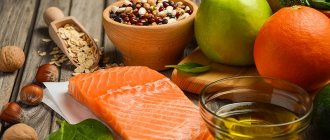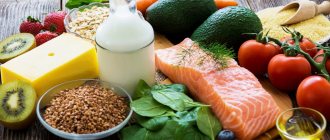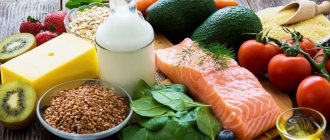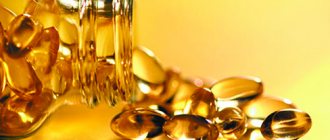November 13, 2012
Not every type of fish is suitable as a source of Omega-3 fatty acids. We tell you where to look for these healthy fats.
It’s not for nothing that fish is called “brain food”: it contains essential Omega-3 fatty acids. According to scientists, these “good” fats are a powerful anti-inflammatory agent that helps the body prevent a wide variety of diseases - from vision loss to Alzheimer's disease. However, not every type of fish is suitable as a source of Omega-3 fatty acids. The inhabitants of cold waters are rightfully considered to be the leaders in the content of these useful substances.
. Let's get acquainted.
Fish and the main thing about it
How much fish should you eat? How to choose and store it correctly? What fish should you not eat? We tell you the most important things about this product.
Herring
Our hit parade is headed by the beloved herring. It can be consumed in any form, including grilled. True, in the latter case you will have to get fresh herring, otherwise you will end up with a dish that is popular in Vietnam, but very specific. Herring is also an excellent source of protein, calcium, magnesium, potassium, niacin, vitamin B-12 and selenium. Champion, in a word. Material on the topic: 5 ingenious dishes with common herring .
Herring
What you need to know about Omega-3 in fish?
The main source of Omega-3 fatty acids is fatty fish. It is believed that fish and seafood should be consumed at least 3 times a week to get enough of these same acids.
Daily consumption rate
All dietary fats that a person receives during meals consist of 3 different types of fats: saturated, monounsaturated and polyunsaturated. For the normal functioning of all organs and systems, experts recommend adhering to the rule that polyunsaturated fatty acids (PUFAs) should be 10% of the total fat.
Omega-3s are not synthesized by the body and come only from the outside (with food or special supplements).
The Ministry of Health recommends following the norm of 1–2 g per day. This is exactly how much PUFA is needed for the acid to cope with its main task and participate in all types of metabolism and regulation of the body.
In this case, the daily norm may increase to 3 grams in some people:
- in pregnant and lactating women;
- athletes;
- old people;
- children;
- people with autoimmune diseases and pancreatic pathologies (including diabetes).
The daily norm of PUFAs is contained in 1 serving of fish, equal to 100 grams. However, you need to remember that not all fish is equally healthy and some Omega-3 may be lost during processing, transportation, storage and cooking, so sometimes the portion can be increased to 200 g.
Fatty fish in cold waters
These types of fish are record holders for Omega-3 content. In addition, they have the most favorable ratio of Omega-3 and Omega-6 fatty acids, which together have a positive effect on heart health and vascular condition.
Oily fish that live in cold seas contain up to 20% Omega-3 PUFAs. The record holders for the content of this substance are whitefish, salmon, sockeye salmon, Chinook salmon, trout, mullet, horse mackerel, mackerel, sea bass, and halibut.
Lean fish may contain only 3-5% Omega-3 fatty acids.
Catch sites and food supply
The most important role for the body is played by where the fish was caught and what it ate. The fact is that fish get Omega-3 from the algae they eat, so the most valuable is the fish that lives in natural bodies of water where fishing is allowed.
Fish caught in Kamchatka, near the Kuril Islands, near Sakhalin, as well as in the waters of the Pacific and Atlantic Oceans, the Sea of Okhotsk and the Barents Sea can be considered safe.
Individuals raised in captivity often have a diet that does not correspond to the norm, so their benefit is minimal.
Dangerous toxins in fish
Due to dangerous emissions into water bodies resulting from industry and human activity, these same water bodies become polluted and accumulate many harmful toxic substances.
Some varieties of fish have the ability to accumulate toxins in their bodies, causing their meat to become poisonous. The most dangerous chemical is mercury, which is often found in large quantities in the meat of grouper, marlin, king mackerel, swordfish, codfish, sharks, and hoplostet.
Salmon
You can prepare a lot of different dishes from salmon Or you can simply put a piece of lightly salted fish on a piece of bread and eat it like a sandwich. Here's a quick recipe for homemade gravlax - sprinkle salmon fillets with sea salt, freshly ground pepper, and coarsely chopped dill. You can add a little (teaspoon) brown sugar. Wrap in foil and put in the refrigerator overnight. The next day you can eat. Material on the topic: how not to make a mistake when buying lightly salted salmon .
Salmon
Omega-3 content in different types of fish
From which fish can you get the most useful polyunsaturated acids? The data is shown in the table below:
| Fish | Omega-3 content (mg/100 g of product) |
| Chinook | 2342 |
| Mackerel | 2299 |
| Whitefish | 2101 |
| Salmon | 1966 |
| Herring | 1943 |
| Ocean sardine | 1900 |
| Omul | 1760 |
| Anchovy | 1750 |
| Pink salmon | 1590 |
The highest amount of Omega-3 is found in salmon caviar - 6820 mg/100 g of product.
Mackerel
In addition to omega-3 fatty acids, mackerel contains many other important vitamins and minerals. Most often it is consumed smoked, but this fish is good in any other form. Fresh mackerel is best prepared by fishermen in Istanbul - they fry the freshly caught fish right in the boats, and then put it in a fresh bun, burger-style. Incredibly delicious! Related material: How to cook mackerel: 15 recipes that will make you fall in love with this fish.
Mackerel
Fish and seafood richest in Omega-3
The table below will help you compare the Omega-3 content in different fish. The table describes the main products, how many acids are in each type, in descending order.
| Product type | Omega-3 content per 100g |
| Red salmon caviar | 6,789 |
| Salted mackerel | 1,8 – 5,3 |
| Atlantic salmon | 2,586 |
| Alyutor herring | 2,418 |
| Atlantic herring | 2,01 |
| Canned anchovies | 1,4 – 3,5 |
| Braised river whitefish | 1,4 |
| Carp | 1,1 |
| Trout | 1,06 |
| Canned sardines | 0,9 |
| Pollock | 0,5 |
| Pacific saury | 0,5 |
| Atlantic cod | 0,4 |
| Squid | 0,4 |
| king crab | 0,4 |
| Shrimps | 0,3 |
| Mussel | 0,6 |
| Oyster | 0,4 – 0,6 |
| Pike | 0,1 |
The table indicates that the richest in fatty acids is red salmon caviar.
Which fish has more omega-3 fatty acids?
The value of fish depends on the presence of vitamins, microelements and healthy fish oil, according to the content of which it can be divided into 3 groups: fatty, medium-fat and low-fat varieties. The more fat it contains, the richer the fish is in omega-3 fatty acids.
Omega-3 content varies in different types of fish - from 3% to 20%
Omega-3 content in different types of fish:
- Fatty varieties contain up to 20% omega-3. They are considered the most beneficial for the human body.
- Medium fat varieties contain an average of 8-10% omega-3. They are also rich in healthy proteins. These varieties are used in the nutrition of athletes and in dietary nutrition for obesity.
- Low-fat varieties contain up to 6% omega-3. The meat of this fish is easily digested by the body. It is valued in cooking for its quick preparation.
What is Omega-3 for?
Our body cannot synthesize omega-3s on its own, which are essential for it. They are the building blocks of the cells of the human body. This is an important component of a healthy diet. Omega-3 fatty acids benefit our body by performing the following functions:
- Help stimulate brain function. The docosahexaenoic acid found in them is necessary for the proper functioning of the cerebral cortex. Their content in the body activates cerebral circulation and the conduction of nerve impulses. Acids are involved in the work of coordination centers, improve memory, thought processes, logical thinking and concentration. Allow the brain to coordinate the work of the centers responsible for vision.
- Participate in restoring the functioning of the immune system. They are necessary for the formation of membranes around neurons and the synthesis of eicosanoids, molecules that help immune system cells communicate with each other. These particles activate white blood cells to protect the body from viruses and bacteria, reduce the concentration of inflammatory factors and stimulate tissue regeneration. They are especially useful for young children whose immune systems are just beginning to develop, and for pregnant women.
- Restore and support the functioning of the central nervous system, stabilize the psycho-emotional state. They take part in the synthesis of serotonin and dopamine, which are responsible for feelings of happiness, joy, pleasure and protect against depression.
- They improve the functioning of the circulatory system, reduce cholesterol levels in the blood, cleanse blood vessels, restore the walls of blood vessels and normalize blood pressure. Acids reduce blood viscosity, preventing thrombosis. This is a good preventative against sclerosis, hypertension and cardiovascular diseases. Omega-3s reduce the risk of coronary heart disease and arrhythmia.
- Reduces the amount of fat in liver cells in cases of fatty hepatosis. For a healthy body, they prevent this disease by reducing fatty deposits in the liver and reducing the risk of developing this disease. They participate in the production of vitamin D and prevent the accumulation of cholesterol plaques in blood vessels.
- They take part in restoring the functioning of the musculoskeletal system. The high content of omega-3 in fish helps stimulate the process of bone formation, slows down the destruction of joints and blocks inflammatory processes in them. They are useful for rheumatoid arthritis, arthrosis, and degenerative changes. Taking omega-3 regularly after 40 years of age can help prevent these diseases.
- Improves the functioning of the female body. Normalize hormonal levels and the state of the reproductive system. Reduce the risks of gynecological diseases, prevent the formation of fibrocystic and tumor processes in the genitals and mammary glands. Stabilizes the menstrual cycle and eliminates premenstrual syndrome. Omega-3 delays the onset of menopause and promotes normal physiological progression. During menopause it makes it less pronounced. In case of infertility, it increases the body's ability to conceive.
- Eliminate problems in the functioning of the male body. Prevents inflammatory processes in the prostate gland, restores vascular elasticity, normalizing microcirculation and tissue regeneration. This eliminates pain and discomfort, normalizes spermatogenesis and urination. Acids restore the proper functioning of the genital organs, hormonal levels, improving the quality of sexual life. Omega-3s promote sperm renewal, increasing the likelihood of conception, and are useful for improving sperm quality and the health of the future fetus after fertilization.
- Increase metabolism. Consuming sufficient amounts of omega-3 prevents the deposition of fat in the abdomen and waist and promotes their burning. They are useful for losing weight in combination with exercise. In this case, the body is supplied with energy from fats, and proteins are used to build a beautiful body.
consuming omega-3 helps maintain human health and beauty
The use of omega-3 in cosmetology for healthy facial skin contributes to:
- inhibition of excessive activity of the immune system, preventing the development of allergies;
- preserving the elastic basis of the skin - collagen, which is responsible for elasticity and the absence of wrinkles;
- fight acne, dermatitis, accelerate skin healing, eliminate chronic inflammation;
- nourishes the skin, eliminating earthy color, dryness and thinning;
- protection from the destructive effects of ultraviolet radiation and helps the skin survive stress.
Salmon
Salmon is the most popular type of fish and is considered the richest source of Omega-3. In almost any supermarket you can find this fish chilled and frozen. However, fish grown on specialized farms most often ends up on our tables. Unfortunately, feeding with compound feed and keeping them in cages reduces the beneficial properties of salmon. Therefore, it is worth paying attention to less popular, but cheaper varieties of salmon fish: chinook salmon
,
chum salmon
,
pink salmon
,
sockeye salmon
and
coho salmon
. This fish is caught in the wild and usually ends up on the shelves frozen.
What is Omega-3 for?
Omega-3 contains a number of essential polyunsaturated fatty acids that the body cannot produce on its own. These elements come from food. They have a beneficial effect on health: they remove excess cholesterol, improve brain function and the cardiovascular system. To prevent heart and vascular diseases, you need to consume at least 450 mg of fatty acids daily.
The most valuable omega-3s are docosahexaenoic acid (DHA) and eicosapentaenoic acid (EPA). These are the most important structural elements for the construction of cell membranes. Thanks to them, many processes occur in the body.
- The synthesis of hormones and germ cells is regulated.
- Metabolic processes in the brain and blood lipid composition are normalized.
- Brain function, memory, attention, and learning ability improve.
- Increases stress resistance and immunity.
- Fat metabolism and absorption of fat-soluble vitamins are optimized.
- Improves joint mobility.
- The development of oncological processes is prevented.
The best Omega-3 capsules on iHerb
The official online store of healthy nutritional supplements iHerb offers customers a large selection of Omega-3 capsules. The acid is contained in them in an easily digestible form in a safe dosage, thanks to which the deficiency of the necessary substance can be compensated for in one course of administration.
California Gold Nutrition Fish Oil Capsules
Premium capsules from the Californian manufacturer CGN contain fish gelatin, which, in turn, is a source of Omega-3 PUFAs. The drug is sold in packages of 100 or 240 pieces. One unit contains 640 mg of the main substance.
To obtain the daily requirement of Omega-3, you need to take 2 capsules per day, regardless of meals. Natural fish oil concentrate is manufactured under strict quality control. It does not contain dangerous chemical impurities and substances, including mercury and trans fats.
Capsules are recommended to be taken to replenish PUFA deficiency, to improve immunity, to reduce the risk of cardiovascular diseases and improve brain function.
Omega-3 from California Gold Nutrition (blog photo)
Fat is different from fat!
We need fats for life, they provide the body with energy, participate in the synthesis of various substances, and promote the absorption of certain vitamins.
All fats are divided into saturated and unsaturated. Saturated fats are solid fats from animal products that increase the level of bad cholesterol in the blood and lead to extra pounds. Unsaturated fats (mostly vegetable fats) are needed by our body - they are involved in a number of biochemical processes, are much better absorbed and in reasonable quantities do not cause harm to health.
Unsaturated fats include the so-called essential fatty acids - alphalinolenic and linoleic. They are not synthesized in our body; we can only get them from the outside, along with food. Alphalinolenic acid belongs to the omega-3 group of acids, and linoleic acid belongs to the omega-6 group.
Food against stress. What foods reduce anxiety? More details
Sardines
I catch this fish in the Far East. It is sold in cans. To compensate for the lack of Omega-3 in the body, you need to buy sardines that have the least amount of salt and spices. It is also sold fresh frozen. Baked herring is healthy not only because of the presence of Omega-3 in it, but also because it contains vitamin B.
Worth knowing: Sardines contain coenzyme Q10, which is an antioxidant. This substance is actively involved in the functioning of the human immune system.











